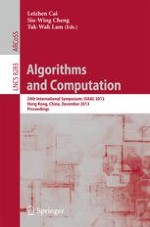2013 | OriginalPaper | Buchkapitel
Better Bounds for Online k-Frame Throughput Maximization in Network Switches
verfasst von : Jun Kawahara, Koji M. Kobayashi, Shuichi Miyazaki
Erschienen in: Algorithms and Computation
Verlag: Springer Berlin Heidelberg
Aktivieren Sie unsere intelligente Suche, um passende Fachinhalte oder Patente zu finden.
Wählen Sie Textabschnitte aus um mit Künstlicher Intelligenz passenden Patente zu finden. powered by
Markieren Sie Textabschnitte, um KI-gestützt weitere passende Inhalte zu finden. powered by
We consider a variant of the online buffer management problem in network switches, called the
k
-frame throughput maximization problem (
k
-FTM). This problem models the situation where a large frame is fragmented into
k
packets and transmitted through the Internet, and the receiver can reconstruct the frame only if he/she accepts all the
k
packets. Kesselman et al. introduced this problem and showed that its competitive ratio is unbounded even when
k
= 2. They also introduced an “order-respecting” variant of
k
-FTM, called
k
-OFTM, where inputs are restricted in some natural way. They proposed an online algorithm and showed that its competitive ratio is at most
$\frac{ 2kB }{ \lfloor B/k \rfloor } + k$
for any
B
≥
k
, where
B
is the size of the buffer. They also gave a lower bound of
$\frac{ B }{ \lfloor 2B/k \rfloor }$
for deterministic online algorithms when 2
B
≥
k
and
k
is a power of 2.
In this paper, we improve upper and lower bounds on the competitive ratio of
k
-OFTM. Our main result is to improve an upper bound of
O
(
k
2
) by Kesselman et al. to
$\frac{5B + \lfloor B/k \rfloor - 4}{\lfloor B/2k \rfloor} = O(k)$
for
B
≥ 2
k
. Note that this upper bound is tight up to a multiplicative constant factor since the lower bound given by Kesselman et al. is Ω(
k
). We also give two lower bounds. First we give a lower bound of
$\frac{2B}{\lfloor{B/(k-1)} \rfloor} + 1$
on the competitive ratio of deterministic online algorithms for any
k
≥ 2 and any
B
≥
k
− 1, which improves the previous lower bound of
$\frac{B}{ \lfloor 2B/k \rfloor }$
by a factor of almost four. Next, we present the first nontrivial lower bound on the competitive ratio of randomized algorithms. Specifically, we give a lower bound of
k
− 1 against an oblivious adversary for any
k
≥ 3 and any
B
. Since a deterministic algorithm, as mentioned above, achieves an upper bound of about 10
k
, this indicates that randomization does not help too much.
